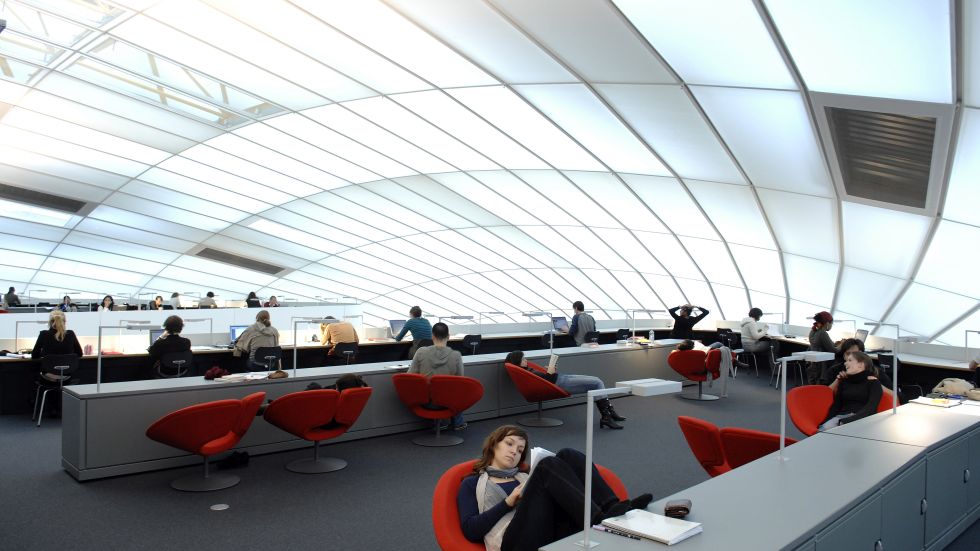Find your PhD position in Germany
Before you start your search ...
Before you start your search you should know that there are different PhD models:
- Individual doctorate or
- Structured PhD programmes
What's the difference? Check out our overview of the various ways to do your PhD in Germany
Find your individual doctorate

The "traditional" or "individual" path to a PhD remains the most common in Germany. An individual doctorate involves a thesis or dissertation that is produced under the supervision of one professor. This form of PhD study offers a great deal of flexibility, but demands a high degree of personal initiative and responsibility.
How to find your PhD supervisor
In Germany there is no central admissions or selection office for doctoral students. Therefore, your first step is to find a suitable professor who is willing to be your supervisor.
One way to find a supervisor is to look for a university institute that matches your area of research. The following online search engines might help you find a suitable supervisor:
- GERiT – German research institutions
GERiT is a website containing information on approximately 29,000 research institutions in Germany. GERiT allows the user to search easily by location or subject. It provides all the information needed to choose an institution at which to research, study or do a doctorate.
www.gerit.org - Finding a PhD position
PhDGermany publishes PhD openings in Germany that specifically target international applicants. Accordingly, in most cases the working language is English. Fluent knowledge of German is only required for certain special positions. PhDGermany helps you find the right PhD opening or supervisor for your doctoral thesis and assists you with the online application process.
www.phdgermany.de - Higher Education Compass
This database provides up-to-date information from universities about doctoral opportunities in Germany. The search engine enables you to carry out targeted searches on the basis of departments, admission requirements and form of doctoral thesis.
www.higher-education-compass.de
Furthermore, your contacts with your professors or previous university could help direct you to a suitable department or potential supervisor in Germany.
It is also helpful to attend academic conferences in your own subject area. There you will be able to exchange information and make contacts – and perhaps even find a future PhD supervisor.
Find your structured PhD programme

Structured PhD programmes in Germany are frequently very similar to the PhD programmes in English-speaking countries, in which a team of supervisors look after a group of doctoral students. Around 12,000 doctoral students from abroad – roughly one in four – do their PhDs in structured programmes. As a rule, it is possible to complete a doctorate in four to five years.
Where to find your PhD programme
There is no central database of all structured PhD programmes in Germany. You can usually find these programmes directly through the respective universities, graduate schools or non-university research institutions. The German Academic Exchange Service (DAAD) database is also a good place to look. Here you will find a large number of PhD programmes that are specially aimed at international doctoral students.
Are you interested in an international doctoral programme in Germany? This DAAD database presents a selection of roughly 230 international doctoral programmes in Germany. The database can be searched according to different criteria.
www.daad.de/international-programmes
Many universities offer structured doctoral programmes, which they publicise on their websites. The Student Advisory Service or Graduate Centre at the respective university will also provide help here. You can find the relevant addresses using the Higher Education Compass provided by the German Rectors’ Conference.
www.higher-education-compass.de
Research training groups are also funded by the Deutsche Forschungsgemeinschaft (German Research Foundation, DFG) for a period of up to nine years. Their key emphasis is on the qualification of doctoral researchers within the framework of a focused research programme and a structured training strategy.
www.dfg.de > Current Research Training Groups
The Helmholtz Association is Germany’s largest scientific organisation. In collaboration with various institutions of higher education, Helmholtz Association research centres have established structured PhD programmes under the auspices of Helmholtz Graduate Schools, Helmholtz Research Schools and Colleges.
www.helmholtz.de > PhD Candidates
The Leibniz Association connects 97 research institutes that conduct problem-oriented research and provide scientific infrastructure of national and international importance. Together with universities they run structured PhD programmes in Leibniz Graduate Schools.
www.leibniz-association.eu > Leibniz Graduate Schools
The Max Planck Society specialises in innovative basic research and its institutes are able to offer up-and-coming researchers excellent infrastructure and support. The website lists the programmes available at International Max Planck Research Schools (IMPRS):
www.mpg.de > International Max Planck Research Schools
In Germany, the best researchers in a specific field are often work at different universities and non-university research institutions spread throughout the country. The Max Planck Schools serve as hubs which gather this distributed knowledge. Here, the brightest minds in their fields have come together from within the scientific community to interconnect in faculties made up of active researchers. Students gain access to these unique networks, learn in close personal exchange from leaders in their fields and their peers, and enjoy access to outstanding infrastructure. Currently, three Schools are operating in the fields of Cognition, Matter to Life, and Photonics.
www.maxplanckschools.de
Application procedures differ from programme to programme. The precise requirements and deadlines can be found on the website of the respective university, research training group or graduate school. You should therefore first choose a PhD programme and/or graduate school.

PhDGermany database
Find a selection of open PhD positions in Germany in the PhDGermany database!
How to apply for a PhD
You've found the position you want to apply for, but how does applying to a potential supervisor or structured PhD programme work in Germany? Find out more here.

Find a job
We help you navigate through the large number of job portals that specialise in openings for academics and scientists. These are some of the sites that may get you started.


Check out our brochure
Doing a PhD in Germany (2019, 40 pages)
This booklet for (prospective) international doctoral students presents the different options for doing a doctorate in Germany. It explains the formal requirements and gives some practical advice on finding the right supervisor or doctoral programme. It also outlines different sponsorship and funding options.